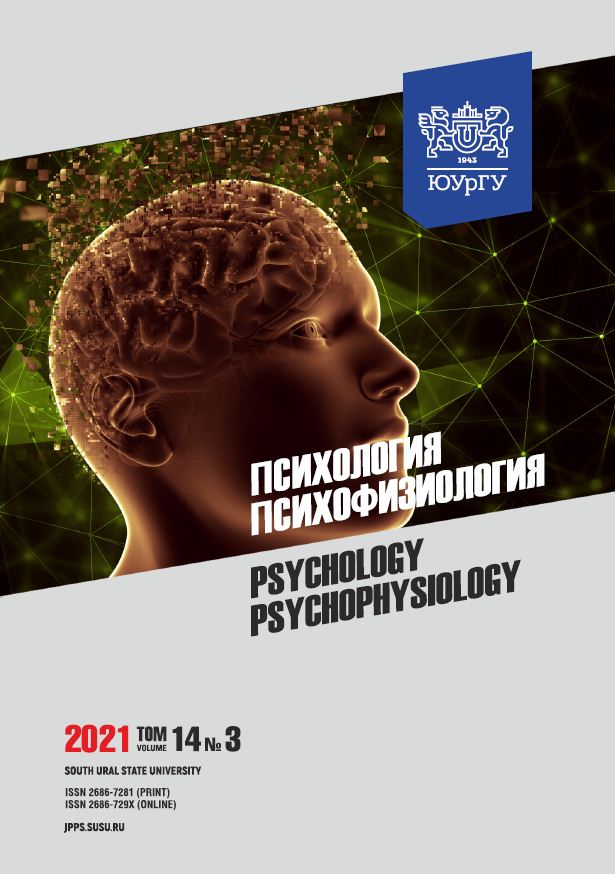SUBJECTIVE WELL-BEING OF WORKING-AGE PEOPLE DURING THE PANDEMIC
Abstract
Abstract. The COVID-19 pandemic affected working-age people and influenced the subjective assessment of population well-being. The study of this problem can help to develop regional and state programs of socio-economic development. Aim. The paper aims to investigate satisfaction with life among working-age people during the pandemic. Materials and methods. The study was conducted between December, 2020 and March, 2021. 142 working-age residents of the Ural Federal District, including 82 women (57.7%) and 60 men (42.3%) aged from 24 to 65 years, took part in the study. The subjective well-being of working-age people during the pandemic was chosen as the subject of the study. The study was conducted in three stages: satisfaction with life survey, measuring the impact of the pandemic on various spheres of life, identifying the correlations between the impact of the pandemic and the subjective well-being of working-age people. The following methods were used: Satisfaction with Life Scale (by E. Diener as modified by D.A. Leontiev and E.N. Osina), a socio-demographic questionnaire, which also contains the questions on the impact of the COVID-19 pandemic on various spheres of life. The results obtained were processed with the Spearman's rank correlation coefficient. Results. The examination revealed that the pandemic affected both satisfaction with reality and the achievement of life goals among working-age people. A greater impact of COVID-19 was recorded for the professional success and social life of respondents, and the lesser one for their personal life. Conclusion. The correlations between satisfaction with life and the impact of the pandemic on various spheres of life were found. The higher the respondents assessment of the danger of COVID-19, the greater their desire to change something in their life.
Downloads
References
2. Trotsuk I.V., Koroleva K.I. Subjective well-being – quality of life or happiness? Gumanitarnye, sotsialno-ekonomicheskie i obshchestvennye nauki = Humanities, social-economic and social sciences. 2020; 9: 57–62. (in Russ.). DOI: 10.23672/w3129-9969-0189-t
3. Lactionova E.B., Matyushina M.G. Theoretical analysis of the scientific approaches to positive human functioning: happiness, psychological well-being, subjective well-being. Izvestiya irkutskogo gosudarstvennogo universiteta. Seriya “Psichologiya = The bulletin of Irkutsk State University”. Series “Psychology”. 2018; 26: 77–88. (in Russ.). DOI: 10.26516/2304-1226.2018.26.77.
4. Lykken D., Tellegen A. Happiness is a stochastic phenomenon. Psychological Science. 1996; 7 (3): 186–187. DOI: 10.1111/j.1467-9280.1996.tb00355.x.
5. Diener E., Oishi S., Lucas R.E. Personality, culture and subjective well-being: Emotional and cognitive evaluations of life. Annual Review of Psychology. 2003; 54: 403–428. DOI: 10.1146/ANNUREV.PSYCH.54.101601.145056
6. Danilenko O.I., Xu Yidanс Correlation between subjective well-being and hardiness in Chinese students. Elektronnyi nauchnyi zhurnal = The Electronic Scientific Journal. 2016; 5 (8): 295–300.
(in Russ.). DOI: 10.18534/enj.2016.05
7. Joshanloo M., Sirgy M.J., Park J. Park Joonha Directionality of the relationship between social well-being and subjective well-being: evidence from a 20-year longitudinal study. Quality of Life Research. 2018; 27 (2): 2137–2145. DOI: 10.1007/s11136-018-1865-9.
8. Kozlova N.S., Komarova E.N. Specifics of subjective well-being of a person in respect to the level of education. Integratsiya obrazovaniya = Integration of education. 2015; 19 (1): 60–64.
(in Russ.). DOI: 10.15507/Inted.078.019.201501.060
9. Savenysheva S.S., Petrash M.D., Strizhitskaya O.Yu. Life satisfaction, psychological well-being and marital satisfaction in adulthood. Mir nauki = World of Science. 2017; 5 (1): 1–9. (in Russ.). https://www.elibrary.ru/item.asp?id = 29095909
10. Gasanova P.T. Experience of loneliness and subjective well-being of a person. Interaktivnaya nauka = Interactive science. 2019; 11 (45): 8–10. (in Russ.). DOI: 10.21661/r-508793
11. Diener E., Fujita F. Resources, personal strivings, and subjective well-being: A nomothetic and idiographic approach. Journal of Personality and Social Psychology. 1995; 68 (5): 926–935. DOI: 10.1037/0022-3514.68.5.926
12. Dluhosch B. The Gender Gap in Globalization and Well-Being. Applied Research in Quality of Life. 2021; 16 (2): 351–378. DOI: 10.1007/s11482-019-09769-2.
13. Garcia D., Sagone E., De Caroli M.E. [et al.] Italian and Swedish adolescents: differences and associations in subjective well-being and psychological well-being. PeerJ. 2017; vol. 5 (e2868): 1–15. DOI: 10.7717/peerj.2868
14. Almakaeva A.M., Gashenina N.V. Subjective WellBeing: Conceptualization, Assessment and Russian Specifics. Monitoring obshchestvennogo mneniya: ekonomicheskie i sotsialnye peremeny = Monitoring of Public Opinion: Economic and Social Changes. 2020; 155 (1): 4–13. (in Russ.). DOI: 10.14515/monitoring.2020.1.01.
15. Lyusova O.V. Subjective well-being in the context of Russian family life. Logos et Praxis. 2017; 16 (4): 97–104. (in Russ.). DOI: 10.15688/lp.jvolsu.2017.4.10.
16. Nemirovskaya А. Subjective Well-Being and Conflicting Social Identities in the Frontier Regions of Russia. Journal of Siberian Federal University. Humanities & Social Sciences. 2020; 13 (9): 1541–1558. DOI: 10.17516/1997-1370-0662.
17. Sychev O.A., Gordeeva T.O., Lunkina M.V. et al. Multidimensional Students Life Satisfaction Scale. Psikhologicheskaya nauka i obrazovanie = Psychological Science and Education. 2018; 23 (6): 5–15. (in Russ.). DOI:10.17759/pse.2018230601.
18. Davedenko S.V. The coronovirus epidemic as a threat to human well-being, through its self-expression. Vestnik Samarskogo gosudarstvennogo tekhnicheskogo universiteta. Seriya: Filosofiya = Journal of Samara State Technical University, Ser. Philosophy. 2020; 3 (5): 43–48. (in Russ.). https://www.elibrary.ru/item.asp?id = 44285063
19. Alves R., Lopes T., Precioso J. Teachers well-being in times of Covid-19 pandemic: factors that explain professional well-being. International Journal of Educational Research and Innovation. 2021; 15: 203–217. DOI: 10.46661/ijeri.5120
20. Rasskazova E.I., Leontiev D.A., Lebedeva A.A. Pandemic as a Challenge to Subjective Well-Being: Anxiety and Coping. Konsultativnaya psikhologiya i psikhoterapiya = Counseling Psychology and Psychotherapy. 2020; 28 (2): 90–108. (in Russ.). DOI: 10.17759/cpp.2020280205
References on translit
-Copyright (c) 2022 Psychology. Psychophysiology

This work is licensed under a Creative Commons Attribution-NonCommercial-NoDerivatives 4.0 International License.



